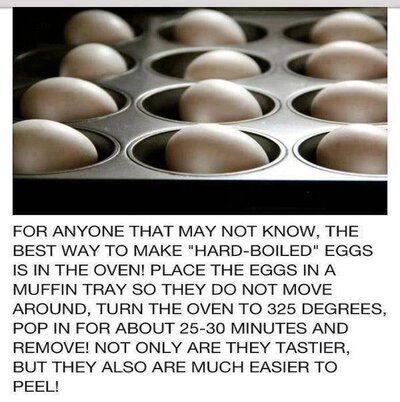I found this recipe on Facebook awhile back. Finally got to try it. It works! And, the shells are much easier to peel. I was boiling the eggs with a teaspoon of baking soda to soften that membrane on the egg. But, by baking them the membrane is not a problem. See the attached picture. I am not so good at attaching files, so forgive me!
Just in case - put a raw egg in each of the 12 spots in a muffin tin. Bake for 25-30 minutes in a 325 degree oven.
Just in case - put a raw egg in each of the 12 spots in a muffin tin. Bake for 25-30 minutes in a 325 degree oven.






